A brand questionnaire is a critical tool for understanding a client's business, motivations, and unique positioning before embarking on a branding project. It helps clarify the client's expectations and ensures a cohesive brand identity. Key elements include questions about brand identity, target audience, messaging, visual preferences, and strategic goals. Using a brand questionnaire streamlines the creative process, making it easier to deliver a product that aligns with the client's vision. For freelancers and agencies, this tool is invaluable for reducing guesswork and improving client satisfaction, ultimately leading to more successful branding outcomes.
Have you ever struggled to understand your client’s business before submitting a scope of work or quote template? You have a general idea of what they do, sure… but you can’t really wrap your head around what makes them unique, or how you are going to communicate that in an awesome brand.
As a creative freelancer, you know how to deliver a great product, but you’re no mind reader! They’re not necessarily a difficult client, but you’re just struggling to find clarity. It’s completely reasonable to want to know a little bit more about your client’s business, its motivations, its positioning and its underlying personality before tackling a branding project.
There’s good news: creating a branding questionnaire for your customers is going to make your job a whole lot easier because it takes the guesswork out of what your client expects.
At Bonsai, we’re dedicated to giving you all the information and tools you need to set yourself up for success - so let us show you why creating a branding questionnaire for clients is a great idea, and how you can come up with one that works.

1. First thing’s first, what is a brand identity?
As any designer or marketing freelancer knows, your brand is a lot more than your brand name. As Forbes explains, your brand is everything that differentiates you from your competitors, including all the feelings and benefits people associate with your services.
Your brand is also a lot more than your visual identity. It’s not just a logo, a color scheme or even a catchy tagline. A good brand also requires you to think about things like your communication strategy, tone of voice, values and other non-visual considerations.
Whether you’re helping your client come up with a logo, a website or a messaging strategy, you need to make sure all these elements of your client’s brand will work together in perfect harmony. But first, you need to know what those elements are -- and the best way to find that out is to ask questions about your client’s brand with a branding questionnaire.
2. What is a brand questionnaire?
What is a brand questionnaire? A branding questionnaire is a series of questions that guide a branding project, whether it’s for a new business or a rebranding project. They are commonly used by graphic designers, web designers, and other freelancers in the branding or marketing industries to get a better sense of their client's wants and needs before diving in.
Branding questionnaires encourage your clients to really think about who they are as a business and how they want to communicate that through their brand. The longer they are, the better, as the more questions your client answers the better sense they - and you - can get of what they want out of the branding (or rebranding) project.
(PS: Have you ever wondered if you’re charging enough for your branding services? Bonsai’s database of freelance rates is here to guide you.) Let's talk about why you should send a branding questionnaire in the first place.
3. Why should I send a branding questionnaire to my clients?
You could just create a brand identity on a whim, choosing colors that you like and values that you think will appeal to your client and their audience, but that’s not a very strategic approach, and chances are the brand won’t work for your client down the road. Instead of going in blind, you need to research what’s actually going to work for your client, their business and their dream clients.
A branding questionnaire for customers is a great way to gather all that information (and this is key) from your client’s perspective.
Sure, you could read up on the business and make your own decisions about whether it’s more masculine or feminine, more serious or laid back, or more edgy or classic -- but that’s not necessarily going to reflect what your client thinks of their own brand.
With Bonsai, you can easily integrate your branding questionnaire of choice into a proposal, and quickly send it to your client.
To start, just click on "send a proposal" from your dashboard.
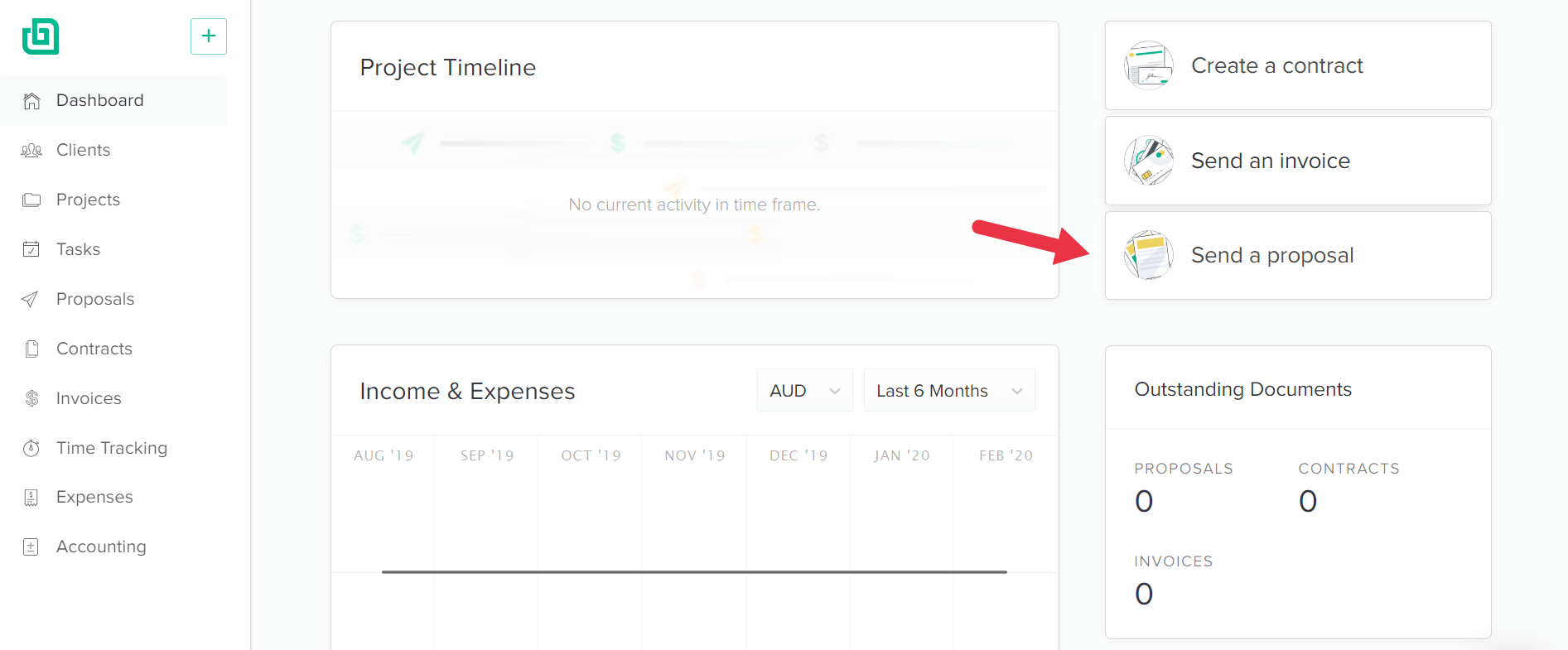
Next up, choose your client and project (or create both), and click on "create proposal".
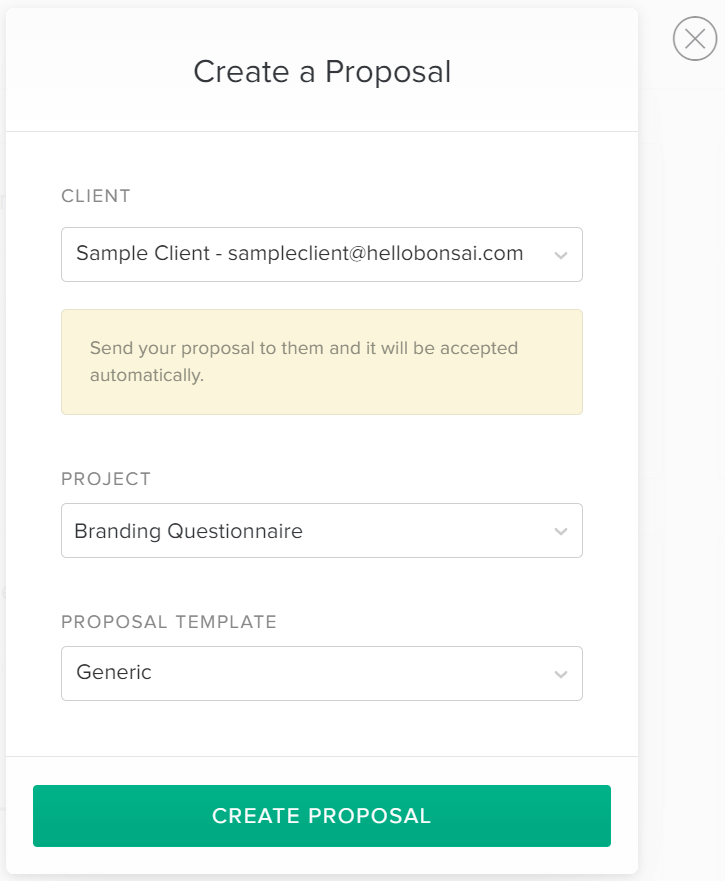
Once done, you'll be in the editing phase of your proposal, where you can set up customer and personal details, or add a background and custom logo to show your professionalism.
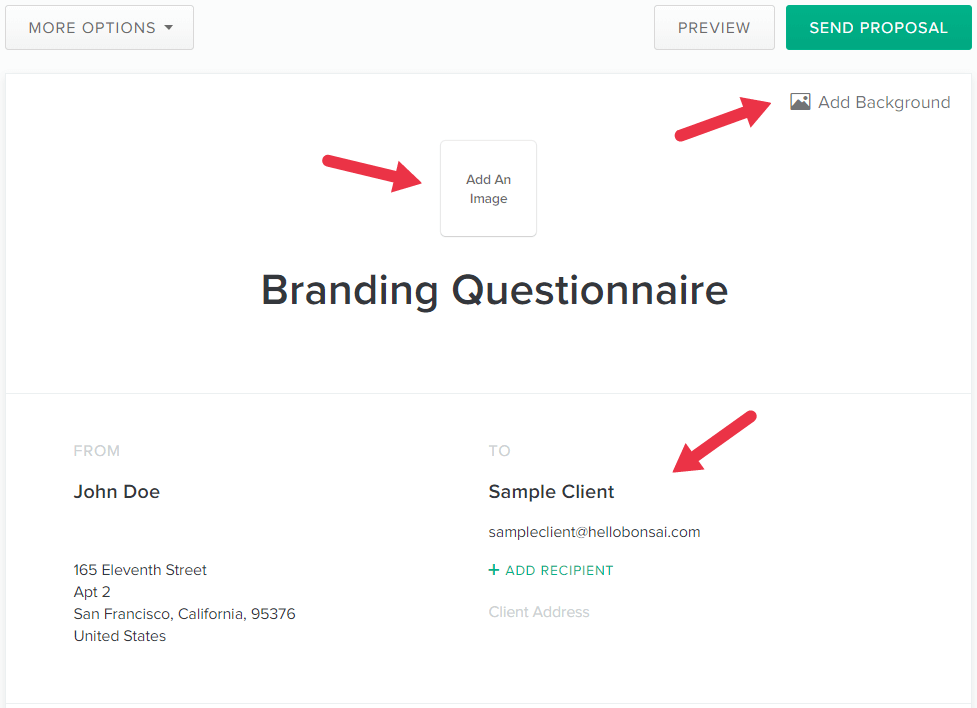
When done, scroll down and you'll reach the custom section of the proposal. Here, the magic happens. You can adjust the sections as needed, rename them, delete them, and add them back.
Feel free to integrate your branding questionnaire with the rest of the proposal, or just send the branding questionnaire.
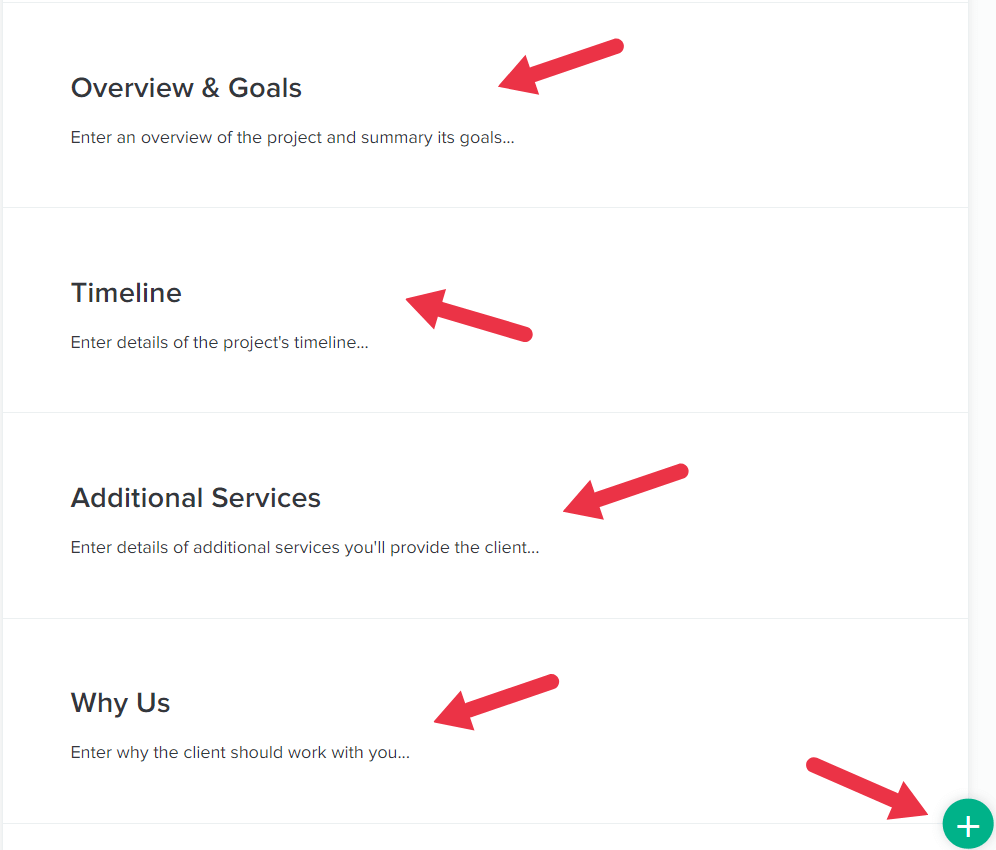
Either way, as soon as you're done, click on "send proposal" and wait to hear back from your new client. Easy, right? Give it a try for yourself by signing up to a free trial of Bonsai.
A branding questionnaire will help you get inside your client’s head, understand your client’s needs, and ensure from the start that you’re making branding decisions - from color choices to iconography - that they’re going to love. You can even build that information into a creative brief to make sure you’re both on the same page.
I. A sample brand questionnaire for clients
Okay, you’re convinced. You know that a branding questionnaire is going to help you really get to the bottom of what your client wants, how they perceive their brand, and how you can communicate that in their new brand identity. But what questions should you ask?
We’re glad you asked.
These brand identity survey questions are a great starting point to uncovering the answers you need. Be sure to expand on them depending on your client, their industry and the nature of the branding project -- and encourage your client to add their own questions and answers if they’re feeling inspired!
Here are a few questions to get you started. Our full branding questionnaire for clients is ready to download right below!
Questions about their business in general
- How would you describe what you do in 20 seconds or less?
- What benefits do you provide your clients? What value?
- How do you position yourself in your market?
Questions about their motivations
- What is your brand’s mission?
- What are your short and long-term goals?
- Where do you see yourself in 1 year? 3 years? 5 years? 10 years?
Questions about their inspirations and competitors
- What colors and images reflect your brand?
- What colors and images do NOT reflect your brand?
- Who are your main competitors?
Questions about their target customers or audiences
- Who is your dream/ideal client?
- Where does he/she hang out online?
- How do you plan to reach him/her?
4. Can I use a branding questionnaire for my own freelance business?
Absolutely! Brand identities aren’t just reserved for big corporations. Having a solid brand identity is one of the most important things you can do as a business owner, whether you’re a freelancer or the CEO of a multinational company.
After all, your brand identity is what sets you apart. It’s what makes people actually want to work with you, not the guy down the road doing the exact same thing for half the price.
Coming up with your brand identity asks you to really dig deep into your motivations for starting your freelance business, your goals, and the value you provide. It can take time and some serious commitment, but it can also be a really fun process - and it’s necessary if you want to set your freelance business up for success.
So, even as a freelancer, it’s important to have a brand identity that communicates what makes you unique and worthy of someone’s time.
That’s part of the reason why Bonsai’s freelance proposal tool, invoice tool, freelance contract tool, and more allow you to apply your brand identity to your proposals, invoices, contracts and more -- because we know how important it is for you to deliver a consistent and professional-looking front to your clients.
If you work alone, your business’ brand and your personal brand are probably one and the same. Your personal brand is your public image, or the way you present yourself to others. eople would rather work with other people rather than a fancy corporate logo. That’s why it’s important that, even as a single freelancer, you identify what makes you you, and why people should work with you.
When it comes to creating your personal brand, it’s important to think about what drives you, what unique value you bring, and how you present yourself online and offline. Use these four simple questions (taken from this Entrepreneur.com article) as a starting point:
- What’s your professional purpose?
- Where do you want to be in 3 years?
- What don’t you want to be known for?
- Who are your business heroes?
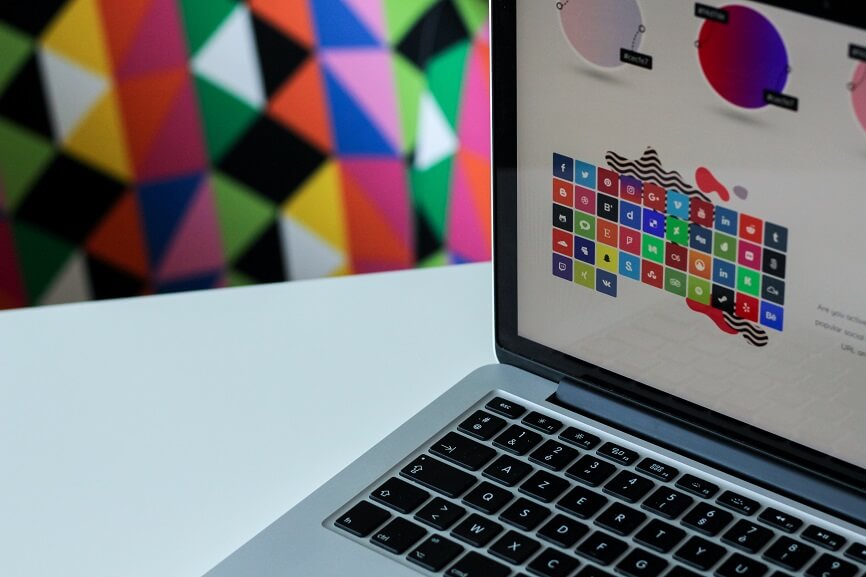
5. I know my existing brand, why would I use one?
The brand questionnaire is a series of questions that you can also use to guide your own brand identity creation. You might need to use one if you’re branding your new business, or if you’re rebranding.
It's a great first step because it answers all those questions you have about what makes you valuable - and, once you know those things, it’s going to make it a lot easier for you to:
- Attract the clients you want, because you’re speaking directly to them and their problems.
- Write valuable content, because you know who you’re talking to and what they want to hear.
- Create marketing materials, because you know what you stand for and how to communicate it (discover 10 ways to make your marketing communications plan work).
- Work with outside consultants as you scale your business, because you can easily get them to understand what you do, and how and why you do it.
Knowing your brand identity is also going to make writing freelance proposals a lot easier, because you already know what makes you stand out and how to communicate that to other people. Knowing this is one of the key first steps to making a great business proposal.
6. Who should answer my branding questionnaire?
That depends on the questions you ask, but generally there should be a good mix of people involved in helping you with your brand questionnaire. Ask yourself some questions - there are going to be some questions that only you (and possibly your team) can answer: questions that prompt you to think about the values that underlie your brand, or your goals and objectives.
If you do decide to complete your own brand strategy questionnaire to create a brand identity for your freelance business, try to start by asking yourself the questions in the above sample brand questionnaire. If you have a team or other freelancers who help you with your business, be sure to get their input as well.
To really make sure your brand identity is going to work for your business and attract the kind of people you want to work with, consider reaching out to your clients or customers and asking them some questions too.
For example, ask them about the feelings or values they associate with your business or why they chose to work with you instead of your competitors. You can also ask them whether they like the tools you use to send your freelance invoice, or whether they think you’re delivering good value for the price you’re charging.
You may not think that things like your freelancing rates fall under branding, but they do. If clients think you’re charging too much (or not charging enough) it probably has less to do with your skills and value and more to do with the way you present yourself.
(PS: If you’re wondering what tools you should be using, check out Bonsai’s stack of best freelance tools; or, if you’re wondering which rates you should be charging, we also have a database of freelance rates to guide designers, developers and marketers.)
No clients yet? No problem - if you’re just starting off and don’t have any customers yet, you can still make sure you involve your future clients in your branding questionnaire. Ask yourself questions about your ideal customers - things like “what pain points am I trying to solve for them”, or “why would they choose me instead of another freelancer”.
II. A sample brand questionnaire for your freelance business
Ready to dig deep and figure out your own brand identity? Here are some brand identity survey questions that you can use as part of your branding questionnaire.
Questions to ask yourself (and your team):
- What is your mission as a freelancer?
- What are your short-term goals? What do you have in mind for the long-term?
- What brand values drive your freelance business?
Questions to ask your clients:
- What problems do I help you fix? Who is your target audience?
- What emotions do you feel or use to describe when you encounter my work/products?
- What words would you use to describe me/my brand?
If you'd like to get your on hands on our full questionnaire to help with your branding, download it right below.
A good brand questionnaire should be personalized to you, your services and the people you serve or your targeet audience. So, take your time and explore a variety of questions to make sure you cover everything you need.
You’re on your way to delivering a fantastic client experience and creating a brand
Congrats! Now that you know the importance of sending a brand strategy questionnaire to your clients (and how to create one that really taps into the branding information you need), you’re one step closer to delivering an amazing experience and creating a brand identity to your client.
Make sure that client experience continues to be great by accurately tracking your time and expenses and invoicing your clients professionally. Don’t forget that your brand identity should be translated into everything that you do - from your business proposals down to your invoices. You should also consider your brand identity when you write a marketing contract.
Bonsai’s user-friendly tools can help you easily apply your branding to all your business documents. Sign up for a free trial today!






